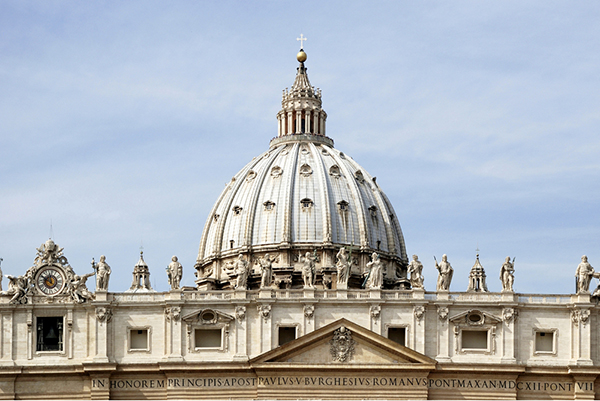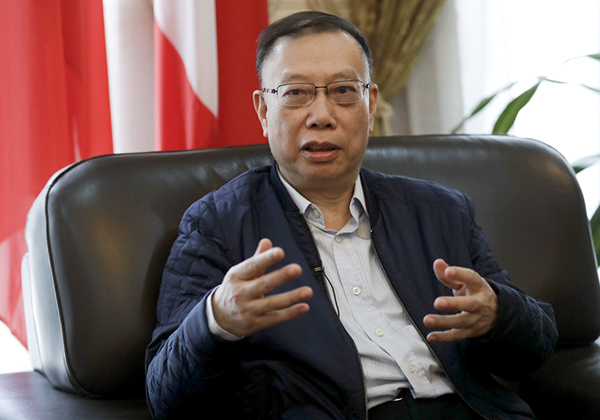
WORLD
PETER PROBST/SHUTTERSTOCK

The dome of St. Peter’s Basilica in Vatican City on sept. 22, 2011.
By Larry Ong I Epoch Times Staff
The Vatican’s Summit on Organ Trafficking and Transplant Tourism ran into controversy after inviting a speaker linked to forced organ harvesting in China.
The summit was held Feb. 7 and 8 at the behest of Pope Francis to address the global problems of organ trafficking and transplant tourism.
Dr. Huang Jiefu, the Chinese regime’s official spokesman on organ transplantation, was China’s representative at the summit. He has claimed that voluntary civilian organ donors were China's only “legitimate source” of organ transplantation, but during the summit, he refused demands to allow that to be verified.
Before the summit, organ harvesting researchers called on its organizer, the Pontifical Academy of Sciences, to offer a balance of evidence on organ harvesting in China.
Instead, on Feb. 7, Huang faced sharp rebuke after he gave a defense of China's current organ sourcing that amounted to only two slides: one pointing to a rise in legal organ donation, the other noting efforts to police black market activity.
Following Huang’s presentation, Dr. Jacob Lavee, president of Israel’s transplant society, insisted that the World Health Organization (WHO) be allowed to conduct surprise inspections and interview donor relatives in China.
Huang’s colleague Dr. Haibo Wang said China shouldn’t be singled out for spot WHO inspections.
No other country has faced similar accusations of mass organ harvesting from prisoners of conscience.
Lavee also said the term “executed prisoners” obscured that organs were also sourced from prisoners of conscience killed extrajudicially.
It is extremely concerning when highly respected international institutions such as the Vatican provide a platform for perpetrating unverified claims about reform of organ donation in China.
Wendy Rogers, professor of clinical ethics, Macquarie University
“This source of organs is excluded from discussion with Chinese officials, because discussing the matter is labeled ‘demonizing China’ with ‘fabricated evidence,’” Lavee said.
Without discussing that source of organs openly, there can be no guarantee of reform, he said.
Huang indirectly provided evidence of organ transplantation abuse over a decade ago when he drew attention to the incomparable speed with which Chinese hospitals could source organs. Experts say that speed is only possible if there is a captive, pre-blood-typed population that can be killed on demand.
Huang staged a high-profile public demonstration of a complicated liver transplant, in the westernmost province of Xinjiang in 2005.
The day before, Huang telephoned hospitals in Chongqing and Guangzhou for two extra, matching livers.
AP PHOTO/ANDREW MEDICHINI

Dr. Huang Jiefu, chairman of China’s National Organ Donation and Transplantation Committee, in Rome on Feb. 6.
The livers were delivered within 24 hours of Huang’s call, but were never used, according to four reports published by Chinese media outlets connected to the regime.
Last June, the U.S. House of Representatives validated the claims of researchers with a resolution that acknowledged that prisoners of conscience, primarily Falun Gong practitioners, are being killed for their organs.
Huang is one of China’s leading transplant surgeons and the chairman of China’s National Organ Donation and Transplantation Committee.
In an email excnange witn the chair or an NGO that seeks to end organ harvesting in China, Bishop Marcelo Sánchez Sorondo, the chancellor of the Pontifical Academy of Sciences, was dismissive toward allegations about China’s organ harvesting and Huang’s involvement.
The Vatican summit was an “academic exercise and not a reprise of contentious political assertions,” he wrote on Jan. 10, in a response to Wendy Rogers, a professor of clinical ethics at Macquarie University and chair of the International Advisory Committee of the International Coalition to End Organ Pillaging in China.
Certain key organ harvesting researchers had participated in “political events on the condemnation of China” such as a U.S. congressional hearing and at the European Parliament, he wrote.
Rogers disagreed. “To simply say that the evidence is ‘political assertions’ masks the real issue, avoids the truth, and provides support to those who++++
+++Francis Delmonico, the former head of The Transplant Society (TTS) and one of the main summit organizers, for his failure to hold China to account for organ harvesting.
Delmonico is “really dedicated” to working “hand in glove” with Huang to promote the idea that China is making medical reforms instead of asking questions about what took place previously, said Gutmann.
Delmonico and Huang are “burying history, burying the bodies so that they are never seen again,” Gutmann said.
“What China has done is the equivalent of a corporation that has produced massive amounts of incredibly toxic material and then buried it where nobody will find it, in the hope that it will somehow seep into the groundwater and be forgotten.”
The Associated Press contributed to this report.